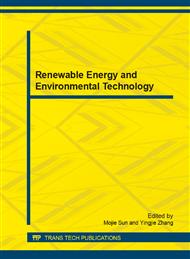[1]
Qiu qiufei, Wu Yuecheng, Lei Liangyu, Zhu Wei. Research on regenerative braking based on SHEV driven by direct wheel [J]. Machinery, 2009, 47(533): 18-22 (in Chinese).
Google Scholar
[2]
Liu Zhiqiang, Guo Xuexun. Electronic-hydraulic-compound regenerative braking control for electric vehicles [J]. Journal of Central South University (Science and Technology), 2011, 42(9): 2687-2691 (in Chinese).
Google Scholar
[3]
Yimin Gao et al. Investigation of the Effectiveness of Regenerative Braking for EV and HEV [J]. SAE Technical Paper 1999-01-2910.
DOI: 10.4271/1999-01-2910
Google Scholar
[4]
S.R. Cikanek, K.E. Bailey. Regenerative Braking System for a Hybrid Electric Vehicle [J]. Proceedinga of American Control Conference, 2002: 3129-3134.
DOI: 10.1109/acc.2002.1025270
Google Scholar
[5]
Ahn J K, Jung K H, Kim D H, et al. Analysis of a regenerative braking system for hybrid electric vehicles using an electro-mechanical brake [J]. International Journal of Automotive Technology, 2009, 10(2): 229−234.
DOI: 10.1007/s12239-009-0027-z
Google Scholar
[6]
Zhan Xun, Qin Datong, Yang Yang, Yang Yalian, Hu Jianjun. A study of control strategy and simulation for regenerative for braking in mild hybrid electric vehicle [J]. China Mechanical Engineering, 2006, 17(3): 321-324 (in Chinese).
Google Scholar
[7]
Yang Yang, Qin Datong, Hu Minghui, Deng Tao. Investigation of control strategy for regenerative braking of HEV based on efficiency optimization [J]. China Mechanical Engineering, 2009, 20(11): 1376-1380 (in Chinese).
Google Scholar
[8]
Zhao Guozhu, Yang Zhenglin, Wei Minxiang, Pan Song, Meng Weiguo. ECE regulation based modeling and simulation of control strategy for regenerative braking in EV and HEV [J]. Journal of Wuhan University of Technology (Transportation Science & Engineering), 2008, 32(1): 149-152 (in Chinese).
Google Scholar
[9]
Zhao Guozhu, Yang Zhenglin, Wei Minxiang, Pan Song. An analysis on braking stability of electro-mechanical brake for an electric minibus [J]. Automotive Engineering, 2006, 28(7): 681-684 (in Chinese).
Google Scholar
[10]
Wang Pengyu, Wang Qingnian, Hu Anping, Yu Yuanbin. Analysis of regenerative brake system of hybrid bus based on Simulink-AMESim co-simulation [J]. Journal of Jilin University (Engineering and Technology Edition), 2008, 38: 7-11 (in Chinese).
Google Scholar
[11]
Luo Yugong, Li Peng, Jin Dafeng, Li Keqiang. A study on regenerative braking strategy based on optimal control theory [J]. Automotive Engineering, 2006, 28(4): 356-360 (in Chinese).
Google Scholar
[12]
Junzhi Zhang, Decong Kong. The Integrated Control of Regenerative Braking System and Air Braking ABS on Electric Wheel Drive Urban Bus [J]. International Conference on Electric Information and Control Engineering, 2011: 4622 – 4625.
DOI: 10.1109/iceice.2011.5777077
Google Scholar


